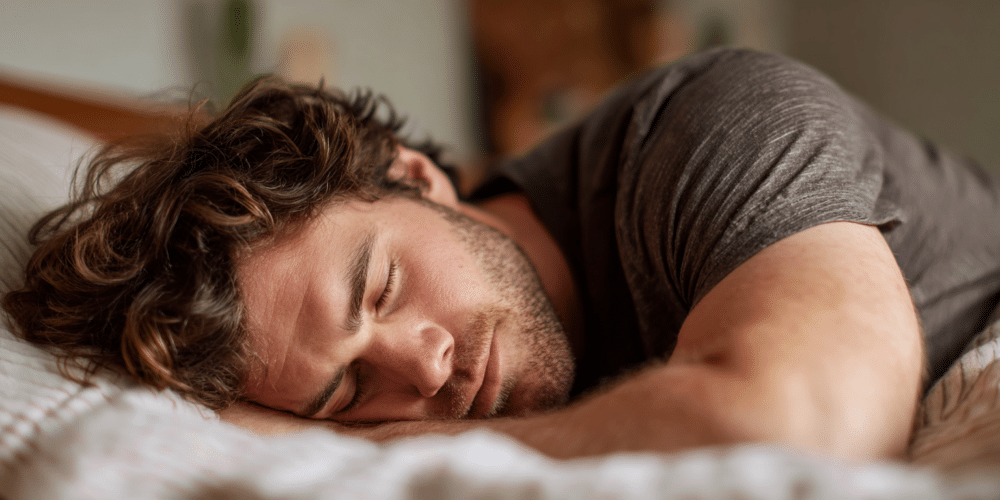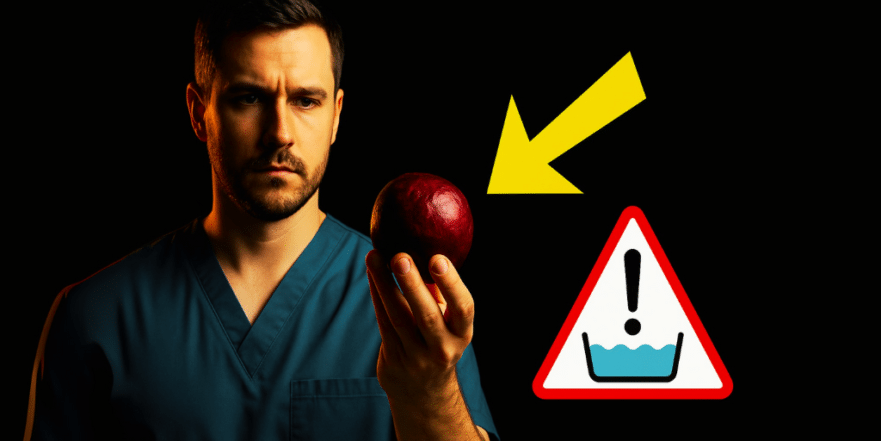➡️4. The Wrong Sleeping Position

Now let’s look at enemy number four: sleeping in the wrong position. This might seem strange, but how you sleep or how you use your pillow can directly affect how much you pee at night. Sleeping on your stomach or in positions where your belly is squeezed can put extra pressure on your bladder. This tricks your brain into thinking it’s full and sends you false signals, even when there’s only a little bit of urine.
Also, if you use the wrong pillows or your body is in a bad position, your breathing becomes more shallow. This can affect your oxygen levels, especially if you have obesity, sleep apnea, or snore a lot. And what happens? You have tiny awakenings that make your body more sensitive to anything, like a slightly full bladder.
So, what are the practical solutions? I recommend that if you can, sleep on your side with a pillow between your legs, but without pressing on your stomach. This lines up your pelvis, improves your airways, relaxes your belly, and makes your blood flow better. I also recommend avoiding sleeping on your stomach or with very high pillows that squeeze your neck or belly, unless you need to for a medical reason.
If you sleep on your back or move around a lot, try a lumbar support pillow or one for your lower back to be more comfortable and avoid turning all night into bad positions. These small changes to your nightly routine can make a big difference in how many times you get up to pee, because your bladder also rests better when you sleep in a good position.
➡️5. Ignoring Fluid Retention and Swollen Legs

We’ve reached the most important part of this. The last three mistakes most older people make. Enemy number five is ignoring fluid retention or swollen legs during the day. Many people don’t notice it, but that swelling in your legs and ankles at the end of the day, or the feeling of heaviness when you walk, isn’t just a cosmetic problem. It’s a sign that your body is holding onto several liters of fluid. When you lie down at night, this fluid will go back into circulation, filter through your kidneys, and end up in your bladder. This is called fluid redistribution, and it’s one of the most overlooked causes of nocturia, which is the medical term for waking up many times to pee.
Understand this: even if you haven’t had a single glass of water before bed, your kidneys will get that extra fluid that built up in your legs during the day and turn it into urine. This happens exactly when your body should be resting and fixing itself. The good news is there are practical solutions. If you often see sock marks on your legs or ankles, or feel heaviness when you walk, it’s a sign from your body that you might have poor circulation.
To help with this, I recommend using compression socks. Put them on during the day and take them off at night. It’s best to talk to a doctor or physical therapist to find out what compression level is right for you. Also, if you spend a lot of time sitting or standing during the day, walk or do calf raises every 1-2 hours. Take 20-30 minutes a day to put your legs up against the wall. All of this helps your body reabsorb the fluids that build up in your legs, improving lymphatic drainage and your circulation before night comes.
But at this point, there’s something that makes the problem much worse, and over 90% of older adults ignore it: too much sodium. I recommend reducing the amount of salt you eat, especially at night. And avoid ultra-processed foods as much as possible: cookies, factory-made breads, processed meats, instant soups, and even sweet foods and drinks, because they have hidden sodium in excess, which makes fluid retention worse. Eating too much sodium also makes you pee more at night because it has a diuretic effect. Now, if the swelling continues despite all this, talk to your doctor because it could be one of the first signs of another internal problem: liver, heart, kidney, or varicose veins, even if you don’t see them on the surface.
➡️6. The Heat and Sleepwear Trap

These can also be signs of other health problems that I’ll tell you about now. Let’s look at enemy number six: the heat and sleepwear trap. This might be one of the most underestimated mistakes of all, and when you fix it, the results can be immediate. I’m talking about the temperature of your bedroom and your body temperature while you sleep. When your room is too hot or you wear thick pajamas that stop your body from cooling down naturally, your body gets stressed.
This messes with a natural process that’s super important for nighttime sleep: the release of a hormone called vasopressin, or antidiuretic hormone. This hormone literally stops you from making too much urine while you sleep. But if your body can’t control its temperature, like it should at the start of sleep, the production of this hormone is affected. This can make you have to get up several times to go to the bathroom, even if you haven’t had a single glass of water at night.
Also, too much heat makes your kidneys filter more fluids, exactly when these organs should be less active. What solution do I suggest? Ideally, sleep with a temperature between 66 and 70 degrees Fahrenheit if you have air conditioning. Also, avoid thick flannel pajamas or fabrics that don’t breathe. It’s best to choose light sleepwear, like linen or cotton. Plus, if you live in a very hot area, use some kind of ventilation by opening windows or using a quiet fan, especially if you don’t have air conditioning. And if you sweat a lot while sleeping, this is also a sign that your body is fighting the environment. Sleeping too bundled up might seem harmless, but it can also be messing up your hormones during sleep.
➡️7. Don’t Ignore This Symptom

Now let’s look at the worst mistake of all: enemy number seven, ignoring this symptom. Because if you’re already doing everything right—you avoided eating late, you watched your liquids before bed, you improved your sleeping position and your room’s temperature—and you’re still getting up several times to pee, this isn’t normal. It’s an urgent sign that you need to see your doctor because it could be the first warning that something deeper is going on.
Sometimes it’s your prostate starting to block your urethra a little, without many other symptoms at first. Or it could be chronic constipation with a lot of poop building up, putting pressure on your pelvis and bladder all the time. Or even heart problems, liver problems, kidney failure, or uncontrolled diabetes—all problems that change how fluids work in your body. And pay attention, because this can also mean poor circulation, or internal varicose veins you didn’t even know you had.
For some people, getting up to pee a lot at night can be a sign of sleep apnea, a condition where you stop breathing for a few seconds during the night. This messes with your deep sleep, affects urine production, and also hurts your heart in the long run. That’s why, if you’ve changed your habits, done your part, and you’re still getting up more than twice at night, don’t say it’s just because of age. Don’t think it’s normal. Get checked out. Many times, if it’s found early, it can be treated very simply, before it gets complicated.
✅Key Takeaways
- Don’t normalize frequent nighttime urination: It’s often a sign of underlying issues, not just aging.
- Watch your fluid intake before bed: Avoid liquids and water-rich foods within two hours of sleep.
- Retrain your bladder: Don’t pee “just in case”; wait for a real urge to help your bladder hold more.
- Optimize your sleeping position: Side sleeping with a pillow between your legs can reduce bladder pressure.
- Address fluid retention: Use compression socks, elevate legs, and reduce sodium intake to prevent nighttime urination.
- Control bedroom temperature: A cool room (66-70°F) and light sleepwear help regulate hormones and reduce urine production.
- Consult a doctor if symptoms persist: If lifestyle changes don’t help, it could be a sign of a more serious health condition like prostate issues, heart problems, or sleep apnea.
Source: Dr. R.N. Veller

